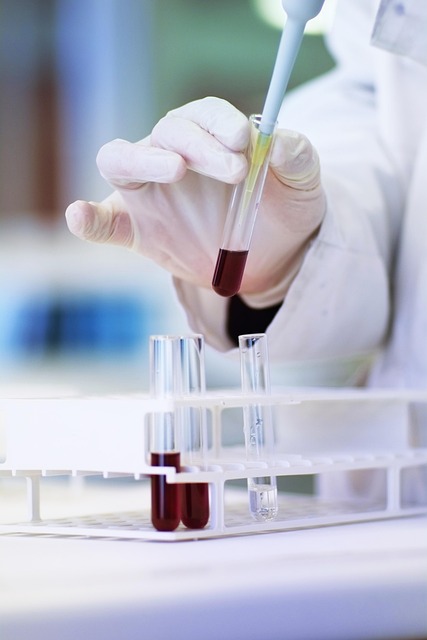Online thyroid test results assess TSH, T3, T4, and sometimes antibodies. TSH levels indicate thyroid function: below 4.0 mIU/L is hyperthyroidism, above 4.5 mIU/L is hypothyroidism. Abnormal results in new moms may signal postpartum thyroid issues. Teen and adult test results aid diagnosis and treatment of conditions like hypothyroidism, hyperthyroidism, and goiter. Antibody levels help identify autoimmune thyroid disorders. Proper interpretation requires professional guidance to avoid misdiagnosis.
Unsure how to make sense of your online thyroid test results? This guide breaks down the complexities of interpreting thyroid panel data. We’ll walk you through understanding key hormones like TSH, exploring T3 and T4 levels, evaluating antibody results, and recognizing common abnormalities. By the end, you’ll be equipped with the knowledge to navigate and discuss your test outcomes effectively with your healthcare provider.
- Understanding Your Thyroid Panel
- Decoding TSH: The Key Hormone
- Interpreting T3 and T4 Levels
- Evaluating Antibody Results
- Common Thyroid Abnormalities
- When to Seek Medical Advice
Understanding Your Thyroid Panel

When you order an online thyroid test results, you’re receiving a panel of tests designed to assess your thyroid function and health. This panel typically includes measurements for TSH (Thyroid Stimulating Hormone), T3 (Triiodothyronine), T4 (Tyroxine), and sometimes additional markers like TPO antibodies or Tg antibodies. Understanding these results is crucial for gauging your thyroid’s performance.
Your TSH level, produced by the pituitary gland to regulate thyroid hormones, serves as a key indicator. Normal ranges vary slightly between labs, but generally, values below 4.0 mIU/L suggest hyperthyroidism (an overactive thyroid), while levels above 4.5 mIU/L may point to hypothyroidism (an underactive thyroid). Maternal thyroid health during and postpartum is especially critical; abnormal results in this period could indicate conditions like postpartum thyroid, warranting prompt attention and potential treatments such as medication or ultrasound for thyroid. For teens experiencing symptoms of thyroid issues, these tests help healthcare providers diagnose and initiate appropriate treatments promptly.
Decoding TSH: The Key Hormone

Decoding TSH: The Key Hormone
When interpreting your online thyroid test results, one hormone stands out as a crucial indicator: Thyroid Stimulating Hormone (TSH). Secreted by the pituitary gland in the brain, TSH plays a pivotal role in regulating your thyroid’s function. This hormone signals your thyroid to produce and release thyroxine (T4) and triiodothyronine (T3), which are essential for managing your body’s metabolism.
A balanced TSH level is vital for optimal health. Elevated TSH, often seen in hypothyroidism, indicates that the pituitary gland is trying to compensate for low thyroid hormone production. Conversely, low TSH levels, a sign of hyperthyroidism, suggest excessive thyroid hormone release. Understanding these dynamics can guide you towards appropriate treatments for conditions like goiter, which may require an ultrasound for thyroid evaluation, or managing thyroid antibodies through tests and relaxation techniques for thyroid health.
Interpreting T3 and T4 Levels

When interpreting online thyroid test results, understanding T3 (triiodothyronine) and T4 (thyroxine) levels is crucial. These are the primary hormones produced by your thyroid gland, which play a significant role in regulating metabolism. Normal T3 and T4 ranges typically indicate a healthy thyroid function. However, if these levels fall outside the reference range, it might suggest underlying issues like hypothyroidism or hyperthyroidism. For instance, low T3 and T4 levels can point to hypothyroidism in new moms, emphasizing the importance of regular screening during and after pregnancy.
In cases where there are concerning thyroid nodules or abnormalities, biopsying them becomes necessary. Thyroid function markers, including T3 and T4, help healthcare professionals assess the extent of the issue. Hypothyroidism treatment, for instance, often involves medication to replace lacking hormones (T3/T4) and corrects symptoms related to underactive thyroid function. Thus, these hormone levels are key indicators in navigating potential thyroid-related health challenges.
Evaluating Antibody Results

When interpreting online thyroid test results, it’s crucial to pay close attention to antibody levels. Antibodies like TPO (Thyroid Peroxidase) and Tg (Thyroglobulin) antibodies are indicators of autoimmune thyroid conditions such as Hashimoto’s thyroiditis, which can lead to hypothyroidism. Elevated antibody levels suggest a possible autoimmune response targeting the thyroid gland. It’s important to note that while these results can be significant, they don’t always indicate an active or harmful condition; some people may have elevated antibodies without any symptoms or thyroid dysfunction.
For individuals with suspected or known thyroid issues, understanding these test results is key. If antibody levels are high, it could mean the body is producing antibodies that attack its own thyroid tissue. However, a diagnosis of autoimmune thyroid disease requires further evaluation considering factors like clinical presentation, other lab results, and ultrasound findings. It’s also worth mentioning that herbal supplements for thyroid health may interact with these tests or influence results; always consult a healthcare provider before making significant dietary changes based on online thyroid test results, especially when considering benign thyroid nodules or assessing thyroid cancer risk factors through thyroid blood tests.
Common Thyroid Abnormalities

Common Thyroid Abnormalities
When interpreting online thyroid test results, it’s important to be aware of common abnormalities that can impact your thyroid function. One such issue is hypothyroidism, characterized by an underactive thyroid gland, which can lead to fatigue, weight gain, and dry skin. Conversely, hyperthyroidism occurs when the thyroid produces too much hormone, causing symptoms like rapid heartbeat, anxiety, and unexpected weight loss.
Another notable condition is thyroid nodule detection, where small growths or lumps form on the thyroid gland. While many are benign, some may require further testing to rule out potential cancerous cells. Additionally, metabolism and thyroid health are closely linked; imbalances can affect energy levels and overall well-being. Herbal supplements for thyroid, such as iodine or certain herbs like astaxanthin, are sometimes recommended to support thyroid function, but consulting with a healthcare professional is crucial before starting any new regimen.
When to Seek Medical Advice

If you’ve taken an online thyroid test result and are unsure about what it means or if further action is required, it’s advisable to consult a healthcare professional. While these tests can provide initial insights into your thyroid function, they should not replace a comprehensive diagnosis from a doctor. Thyroid test results, especially when interpreted without medical expertise, might be misleading, leading to potential health concerns being overlooked or misdiagnosed.
Thyroid issues in teens and adults alike are common, but identifying them requires proper evaluation. Nutrients for thyroid health play a vital role, so if your test suggests an imbalance, seeking advice will help determine the best course of action. Your healthcare provider can order additional tests, offer personalized recommendations, and guide you towards managing any thyroid-related problems effectively.
Understanding your thyroid test results is a crucial step in managing your health. By decoding each component of your thyroid panel, from TSH to T3/T4 levels and antibody readings, you gain valuable insights into your thyroid’s function. Regularly monitoring these markers through online thyroid test results can help identify abnormalities early on, enabling timely intervention. Remember, knowing your numbers is the first step towards optimal thyroid health. Always consult a healthcare professional for personalized guidance based on your unique test results.
